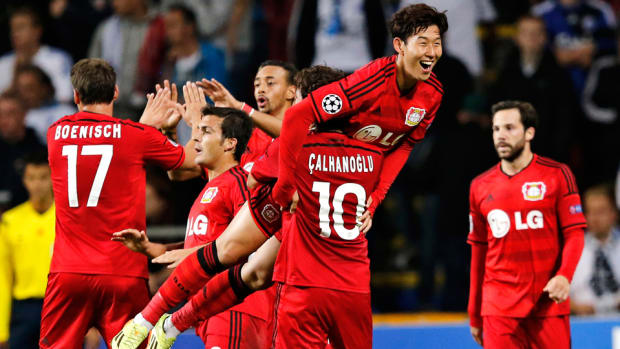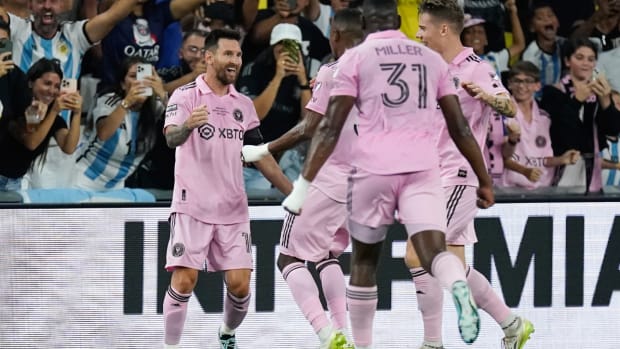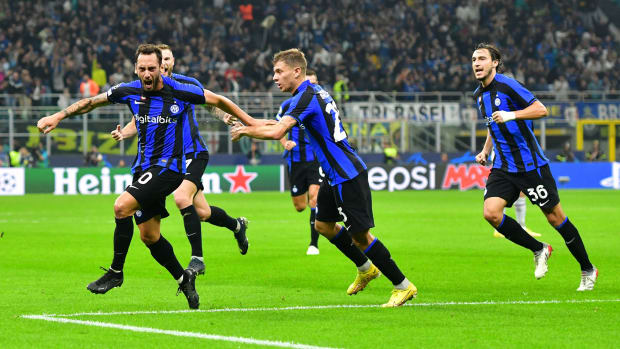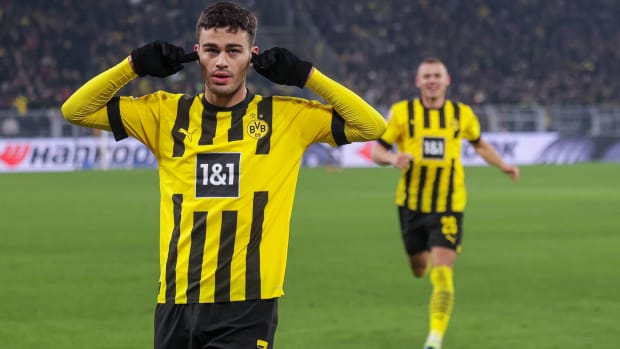Second straight Copa America win solidifies Chile as one of world’s elite
Your teams. Your favorite writers. Wherever you want them. Personalize SI with our new App. Install on iOS or Android.
EAST RUTHERFORD, N.J. — Claudio Bravo dropped to his knees in the corner of MetLife Stadium, raising his arms toward the sky as his teammates swarmed the field behind him, then shifted quickly in his direction. The team arrived to greet the goalkeeper in that corner, jumping and hugging and yelling in a joyous mass, all while stadium workers began to erect the the stage upon which they would celebrate. In the mass of hardware and fencing, the workers inadvertently pinned Chile’s team in its own corner.
Farther downfield, in the center circle, Argentina’s squad dropped to its knees, its backs or hung its heads. The players would stay there as the stage was constructed in front of them and they watched as Chile found its way to it, climbed the stairs and lifted the trophy. La Albiceleste is an easy choice as one of the world’s elite teams (or at least it was before about half the team quit). But on Sunday, after 120-plus minutes of bone-crushing, feverishly intense soccer, followed by a pressure-packed penalty shootout, Chile proved it deserves to be listed right alongside the Argentines in the world soccer elite with a 4–2 win on penalty kicks after a 0–0 draw in the final of the Copa America Centenario.
Chile wins Copa America on PKs; cruel deja vu for Messi, Argentina
“Argentina has a great team. I don’t know if it’s the best in history, but if it’s not the best [it] is very close,” Chile coach Juan Antonio Pizzi said. “They’ve got the best player in history, and logically we have to have certain resources to be able to face off against them.”
The resources Pizzi refers to increasingly seem to resemble the building blocks of the world’s elite squads.
Talent in the right places? Check. In addition to a save in the penalty shootout, goalkeeper Claudio Bravo also made a stupendous, flying-backwards stop off a looping header from Sergio Agüero in extra time, and otherwise controlled his area with assertion. The title is Bravo’s ninth major trophy for club and country over just a two-year span.
“We had a strong team and we did not give up,” Bravo said. “The title is well deserved.”
Farther up the field against Argentina, Arturo Vidal embodied the industry that has become this team’s trademark. Whenever Lionel Messi got the ball on Sunday, Vidal seemed to always be hot on his heels, slowing the Barcelona star down, allowing a second defender to take the ball. Then, right there to receive the subsequent pass, it was Vidal who got Chile going in the other direction.
Then there’s the matter of the team’s forwards. Eduardo Vargas took home the Golden Boot with six goals. Arsenal star Alexis Sanchez won the Golden Ball as the tournament’s best player. Each struggled for chances against Argentina despite their undeniable quality. Each was subbed off, either due to injury (Sanchez left the game in a foot brace) or fatigue. And yet the absence of both at the end of the match reveals another of Chile’s newfound claim to elite status: Enviable depth around its stars.
Of the star players mentioned above, only Vidal took a kick in the shootout, and his opener was saved by Argentina goalkeeper Sergio Romero. The rest of the four kicks that won Chile the Copa America were taken by names that are far from household, and the winner was buried by Francisco Silva, a defensive midfielder who came on as a substitute and has never scored a goal for his national team.
“We managed to put together a group of players that really we need to admire, we need to laud and I hope they will continue evolving with us and continue growing,” Pizzi said. “This group has been really pushing the ceiling of its abilities, and let’s hope we can continue.”
Argentina's Copa final failure pushes Messi toward international retirement
Against Argentina, pushing was Chile’s specialty. Much as Atlético Madrid made its mark in Europe with relentless pressing and hassling of its opponents, Chile has adopted that strategy and harnessed it to create something even more powerful: An almost complete lack of fear. At times on Sunday, it seemed like that fear may bleed into recklessness.
In the 16th minute, Marcelo Diaz committed his first foul, a lunging kick that landed flat across Messi’s upper legs as he broke free on a slaloming run.
It took just 12 more minutes for Diaz to get his second yellow in a similar situation. Perhaps knowing he was on a card, the defender made a big show of turning as Messi broke free, raising his hands as he blocked Messi’s path as if to preempt any potential foul call. It didn’t work. Brazilian referee Héber Lopes went quickly to his chest pocket for the yellow then delayed before drawing the red from his back pocket, almost as if he had forgotten that the first yellow had ever happened.
• WATCH: Messi shanks his penalty in shootout
The game for Chile then was simply to play Argentina as tough as possible heading into halftime. As it turned out, it didn’t even need to last that long, as Marcos Rojo received the second red card of the evening for sliding through Vidal. Before that foul, Vidal had won a duo of headers before recovering and being in a position dangerous enough to merit being slide tackled in the first place.
From there, Chile did what great teams do: It held on and made the best of an ugly situation, as the game turned from madness in the first half to a choppy, tiring affair in the second.
Toxic psyche clouds Argentina as team hits mental breaking point
“We did not play well in the first games, but we knew that we are a strong team,” Bravo said. “We came to play today against a team that we respect a lot because they play well.”
In winning a second consecutive Copa America, the Chileans defended what is theirs. In defeating Argentina both times, it has won against the best teams in the biggest moments. And in doing it in consecutive years, Chile has shown that its particular brand of success is repeatable.
The world soccer elite is an exclusive club, but as Chile lifted the Copa America and the gold confetti rained, the larger meaning became clear. Chile will not be contained, and the elites of international soccer have a new member of their club.





